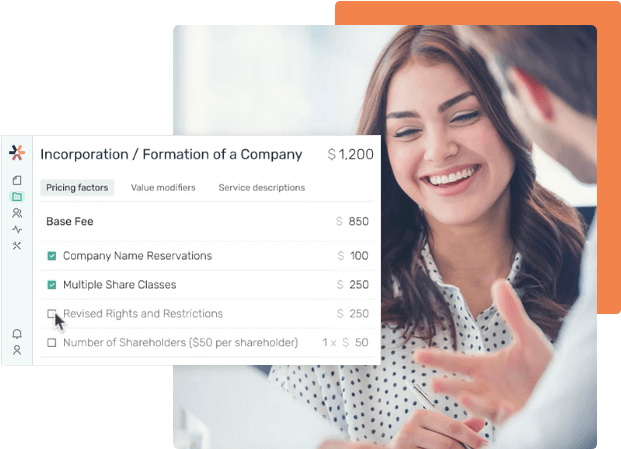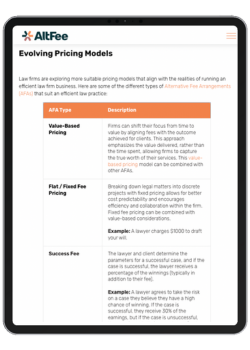- Resources
- 2023 Law Firms Technology Trends Professionals Need to Know
Table of Contents
Most of us know that it’s in with the new and out with the old in 2023. However, that rule of thumb goes far beyond just Gucci shoes and Prada purses.
It also applies to law firms technology trends and changing norms in the legal field. If you work in the legal field in any capacity, staying savvy to those changes and trends is the key to keeping your business competitive and keeping your clients happy.
This guide talks about legal technology trends that law firms should pay attention to so they can better meet goals of efficiency, process improvement, and more. From getting used to automation to ensuring cybersecurity is top-notch, we’ll discuss the latest updates legal professionals should follow to gain a competitive advantage.
Are Law Firms Technology Trends Worth Investing in?
It seems that every time you blink some new kid on the block has come out with a technology they claim will revolutionize the world. But, with so many new trends cropping up, are they really worth it for legal teams to invest in?
Technology trends in law firms help drive improved efficiency and resilience. These trends also help in improving client attorney relations, which in turn help firms achieve better overall performance.
According to the Wolters Kluwer Future Ready Lawyer Survey, 63% of firms investing in legal technology trends in 2022 experienced an increase in their profitability from the previous year. Moreover, corporate legal departments facing daily budget constraints and higher workloads have relied on legal technology trends for work automation. These trends helped them improve their overall productivity.
Additionally, let’s not forget that clients should be the priority. By being aware of law firms technology trends, legal professionals can better meet changing client expectations and fight the growing competition.
A few law tools that can help law firms meet client expectations and stay competitive include:
- Alternative Fee Arrangement scoping and pricing software
- External and internal collaboration software
- Videoconferencing
- Secure file sharing
- Document management
- Case laws and matter management
The 2021 Wolters Kluwer Future Ready Lawyer Survey: Moving Beyond the Pandemic Report revealed that these trending law tools have greatly helped companies adjust and adapt to remote work, especially during the height of the pandemic.
This means that even though you might need to fork over a bit of cash in order to keep up with these trends, they’ll benefit your firm in the long run. It’s a sacrifice worth investing in for the success of your company’s operations and case management.
Why is Being Up to Date with Legal Tech Trends Important?
When technology becomes outdated, it can cease supporting firm objectives and become more of a hindrance than a help.
The table below summarizes the benefits of using up-to-date legal technology:
|
Benefit |
Purpose |
|
Help sustain and meet evolving client demands |
Improve client experience through automated processes and removing possible barriers that can affect client communication |
|
Can help save time and effort |
Sole practitioners and firms alike will benefit the most because more time means they can accomplish more work |
|
Better utilization of available resources |
Help establish clearer internal processes which can improve the efficiency of law firms |
|
Improved access to justice |
Makes it easier for firms to stay savvy about current and changing laws as well as older previous legal documents of past legal issues that could be relevant to a particular case. |
Top 10 Law Firm Technology Trends for 2023
Although new legal trends are constantly emerging, there are a few key technology trends for the legal sector that firms should be aware of for 2023. Investing in and keeping up with these trends can help firms stay relevant and competitive.
Here are ten key legal technology trends that firms need to be aware of in the coming year.
Rapid Adoption of Everything Digital
Back in the day, pencil and paper was king. Today, however, and especially following the COVID-19 pandemic, digitizing as many aspects of the business as possible is paramount. According to the 2021 Clio Legal Trends report, legal service consumers expect to be able to communicate digitally with their attorneys, share documents online, pay their legal fees online, and much more.
Having a cloud law firm absolutely provides mutual benefits for the client and firm, but some specific ways that law firm technology benefits legal professionals include:
- Automating contract creation and filing processes
- Keeps data safe from fraud
- Improve customer experience, especially clients who are almost always online
- Technology provides a more effective way for legal professionals to access information (e.g., e-discovery)
Of course, you won’t be able to introduce a new, digital legal practice CRM out of nowhere. Although firms are trending towards digitizing, this involves careful planning and smooth transitions to ensure no hiccups in processes.
Focusing on Client Experience
Regulatory framework management and legal compliance maintenance are challenges firms constantly face every day because of evolving client demands and expectations. A regulatory framework is a model that legal teams can use to meet local and federal legal regulations and stay compliant.
Firms are now establishing unique ways of improving user experience by addressing the client’s pain points. Moreover, most companies have also started to create regulatory workflow solutions customized for every client.
These efficient workflow solutions have solved various regulatory operations, such as the following:
- Regulatory reporting. Regulation technology (RegTech) is currently a staple in other industries, such as finance, to handle risk management and fraud and is making headway in the legal industry. Rules regarding data storage, security of legal tech software, and more can be difficult for a law firm to manage on its own. RegTech allows law firms to map regulatory risks to business processes, reducing the need for manual checks. Further, advanced data analytics can produce regulatory scenarios, search for new or updated regulations, and then apply those frameworks to existing data to ensure compliance.
- Client privacy maintenance. Protecting consumer information is crucialimportant not only for legal firms but for a number of firms. Thanks to laws such as the GDPR, firms need to pay even more attention to how they manage client privacy. With law firm technology, it becomes easier for attorneys to maintain privacy and adhere to these types of regulations. This helps boost the client experience and keep legal teams out of hot water.
- Long-term security plans. Legal teams can focus on long-term security plans which protect customer information over time. This helps ensure that sensitive information doesn’t get into the wrong hands and keeps firms compliant. It also helps build trust among customers and gives them peace of mind when choosing to work with a particular firm.
Also, customer-centric firms tend to be more successful than those that aren’t customer-centric. Remember that people prefer businesses operating based on what the consumer needs.
This is especially true in the legal industry. Clients expect firms to deliver services according to what they want and need in the most convenient way possible. Today, being a client-oriented law firm is essential for success.
Start Earning More Revenue with Fixed Fees
Break free from hourly pricing and take the fear out of scoping and pricing client projects to start maximizing profitability.
Book A Demo
Higher Bar on Communication
Collaboration is also essential in legal firms. Legal professionals should be encouraged to work together to achieve the firm’s business goals.
According to the Clio Legal Trends Report of 2022, 79% of customers expect a response from their legal teams within 24 hours. That’s a fast turnaround time and sets the bar high on communication.
However, having the right legal technology in place can help make that possible. For instance, legal teams can have centralized document storage systems that make it easy for them to access client documents upon request. They can also send them out at the click of a button to clients rather than having to wait for an in-person visit to connect with clients.
Other types of legal-focused technology, like legal e-billing software, make it easy for clients to pay their bills, helping firms reach higher realization rates.
Automation of Basic Administrative Work
Routine administrative tasks in the legal industry are now ready for automation to achieve better work streamlining. Automating processes are constantly being executed in the following:
- Client intake
- Document collection
- Signature collection
Document automation, a type of legal technology modernization, is now becoming a standard in legal practices. Digital drafting contracts and asking clients for e-signature can save lawyers more time than expected.
Let’s face it, manual processes may be effective but are not as efficient as automation. With automations, legal teams can reduce the time spent on simple tasks, such as collecting signatures or requesting documents, and more on tasks involving deep legal knowledge and research.
Additionally, automated legal templates can help cut down the time it takes for lawyers to draft up key documents. The result can be faster processes and smoother delivery to clients overall.
Artificial Intelligence
According to an annual report of the ABA Profile of the Legal Profession, AI legal tools will become mainstream in the next five years. That was the response of almost 36% of surveyed lawyers. However, the same report revealed that only 10% of lawyers currently use artificial intelligence tools in their firms.
But if you want to remain on your A-game, you must understand how artificial intelligence is shaping the legal industry today. It increases attorney productivity while reducing costly mistakes. Artificial intelligence tools can also help speed up justice, decision-making, and research.
To help you understand, the following are practical examples of using AI in law firms:
- e-Discovery: AI can sift through large data files and pull out key pieces of information, which can help lawyers organize documents more quickly
- Due diligence reviews: AI can review documents to look for legal concepts and create written reports for use later
- Prepare contracts: AI can create contracts or templates that lawyers can later modify, saving time and effort on the part of the legal team
Basically, artificial intelligence helps legal firms in more complex duties, including human planning and problem-solving. What’s more, with AI, machine learning can continue to improve, helping make these processes even simpler over time.
Cybersecurity
Data privacy and cybersecurity are also non-negotiable. With the right cybersecurity tools, your firm can protect sensitive data with clients and externally with witnesses, courts, and other entities.
Regarding cybersecurity, your firm should also be ready to respond in the event that a cyberattack arises. Remember that these attacks can lead not only to client loss but also to reputational damage.
Malware and ransomware are also common, with over 450,000 new malware programs registered every day. So, your firm should be able to withstand these malicious attacks. And because shifting to remote work is now common (more on that later), policies on secure data sharing, security, and privacy are also critical.
Approach to Remote Work
Improved productivity, less contact to avoid getting sick, and fewer commutes—these are just some of the advantages of remote working.
Even though most firms are more used to on-site meetings and planning, it cannot be avoided that remote work is the norm for some. But even as the regulations regarding the pandemic have become more at ease, many legal firms have switched to remote work setups.
For instance, only about 23% of lawyers now work exclusively from the office. Instead, a hybrid setup has become popular, where legal teams can work remotely for a certain amount of time during the month. Although the number of days in the office is up from the height of the pandemic, it’s still lower than pre-pandemic.
Legal firms want to provide as much support as possible so that they don’t lose their valuable team members.
Firms that fear efficiency, control, and collaboration will become tougher due to remote work should think again. Thanks to digital tools and software, file sharing and communication are easier, even online.
Videoconferencing to Meet Client Needs
Videoconferencing technology allows clients to be involved in legal tasks and counsel without physically appearing in your office.
Firms that utilize videoconferencing can improve the lawyer-client relationship by offering a more convenient way to communicate, further establishing trust and loyalty.
Lawyers can also connect with their clients emotionally via videoconferencing, which is much better than a regular phone call. This client connection establishes trust between the attorney and the client and ensures confidence throughout legal processes.
Additionally, video conferencing tools save time, boost efficiency, and increase productivity within the firm. They can reduce the time spent with in-person meetings, speeding up meeting productivity and allowing teams to spend less time on late appointments or traveling to outside meetings. This, in turn, frees up more time for other legal activities, boosting efficiency and productivity.
Data Storage in the Cloud
Allowing data storage in the cloud means your firm utilizes a third-party service provider for all your company’s information about your business and clients. The benefits you can get from this type of data storage involve the following:
- Easier scalability for growing firms
- Reliability
- Saving costs on internal storage systems
- Better access
Cloud-based data storage systems promote real-time collaboration, better version control, and easier file sharing.
Cloud data storage can also help achieve better compliance, especially with privacy and security regulations. For instance, cloud data storage can add multi-factor authentication processes that meet regulatory standards for safe data protection. This can protect firms from violating data privacy laws and can ensure that client information is properly stored and secured from external risk.
Cloud data storage systems come in three types: public, private, and hybrid.
If you’re a cloud law firm with multiple organizations, public clouds are often shared, but each department should have a private cloud or one space in the public cloud. Legal firms with several departments may want to choose the hybrid setup, so there is no data mix-up.
The widespread use of cloud-based data storage can improve a firm’s practice management systems to unify its communication platforms. This helps meet client demands and improve scalability.
Significant Increase in Legal Tech Spending
Now that more firms are aware of the considerable advantages of legal technology, experts are looking at a hefty increase in overall legal tech spending. Gartner’s prediction reveals almost a 12% increase in legal technology spending for corporate legal departments in the next three years.
Regardless of economic uncertainty, legal firm technologies are constantly experiencing high demand, especially because they help streamline administrative work, online document storage, productivity demands, and remote work.
Conclusion
There are several legal technology trends impacting law firms and other businesses within the industry. Things like the increased use of artificial intelligence, a growing need for strong cyber security measures, and the increasing importance of client experience are all examples of some of the trends that 2023 is expected to bring.
To get ahead of these types of trends and support better communication and client experience, having the right legal pricing in place is key. Book a demo with AltFee to learn more about our legal pricing software and how it can support your business amidst changing trends in the coming year.
Start Earning More Revenue with Fixed Fees
Break free from hourly pricing and take the fear out of scoping and pricing client projects to start maximizing profitability.
Book A Demo







Newsletter Signup
Subscribe to our newsletter to receive the latest news.


